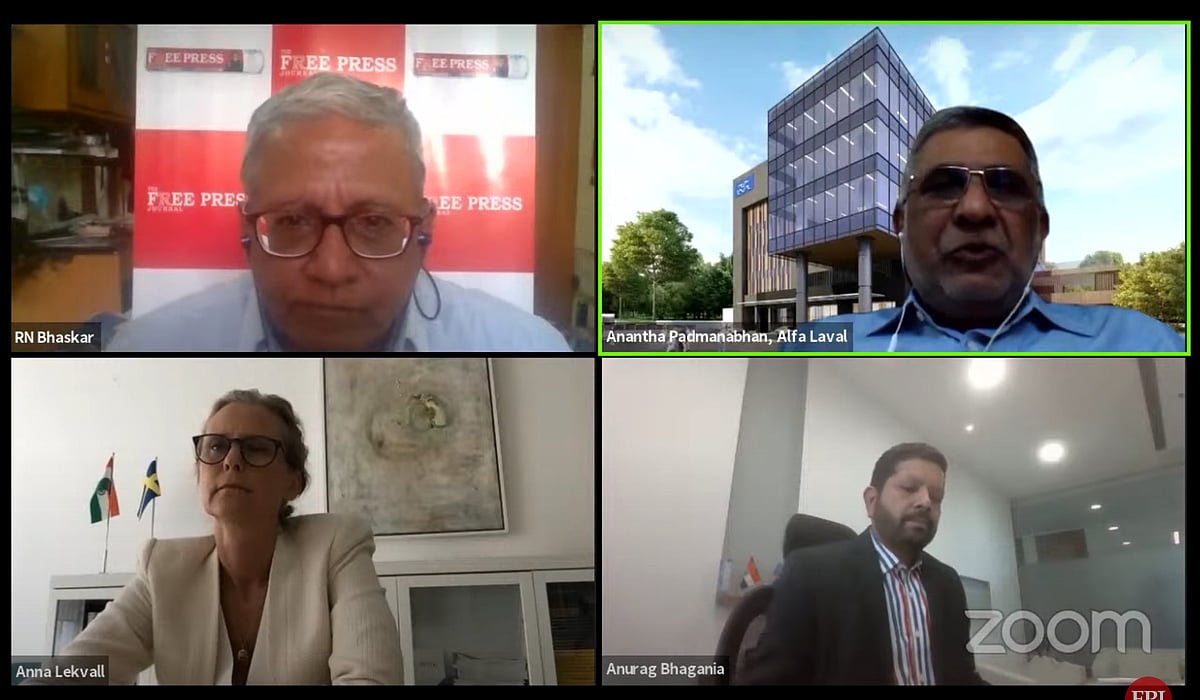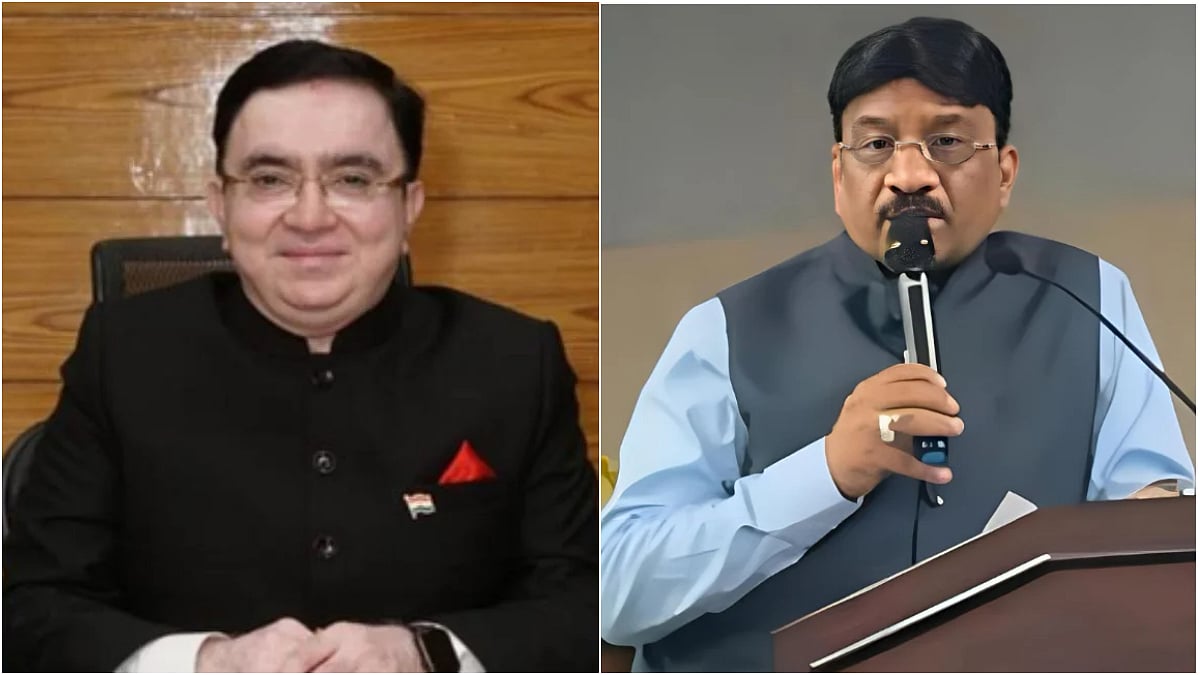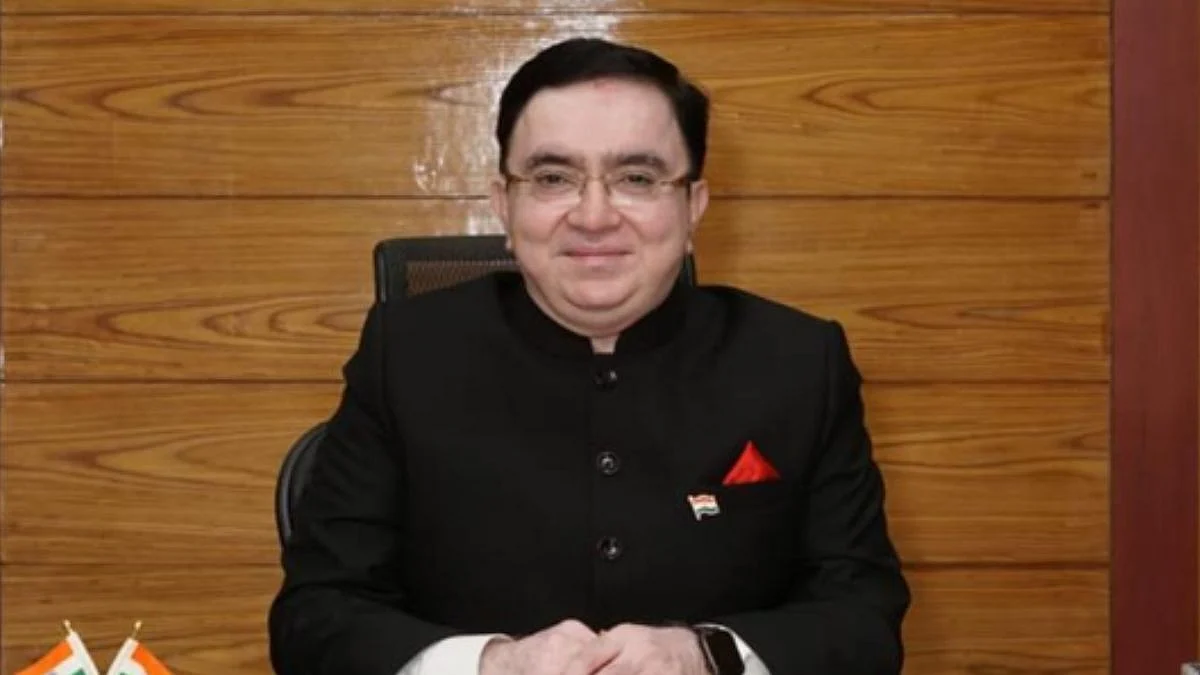Quite interestingly, and significantly, the word ‘Sambandh’ is common to both Sweden and India. In both languages, it means relationship or connection. This relationship between both countries was discussed during a webinar series.
At the ‘Financing India’ session which focussed on Sweden — organised by The Free Press Journal and SIES — India’s need for technology was discussed, and the hurdles in finance opportunities were also explained.
The panellists for the session were (in alphabetical order) Anurag Bhagania, CFO, SKF India Ltd; Anna Lekvall, Consul General of Sweden in Mumbai; and Anantha Padmanabhan, Managing Director India and cluster president for India, Middle-East and Africa, Alfa Laval. R N Bhaskar, Consulting Editor, Free Press Journal moderated the session and Dr Vaneeta Raney, head at BMM Department, SIES, welcomed the panellists.
Given below are edited excerpts:
Sweden-India relations
Anna Lekvall, Consul General of Sweden in Mumbai: India is a highly-valued partner for Sweden. This excellent relationship can be seen growing even further.
In the last five years, there have been 20 high-level visits between the two countries. We have had our prime ministers visiting each other. Last year, we even had a state visit by our Majesties — King and Queen of Sweden. They visited Mumbai for the first time along with a large business delegation. These visits have resulted in many key partnership agreements between both countries.
Healthcare and life sciences; renewable energy, smart cities, sustainable transportation, women empowerment, skill development among others are areas that both countries have been working on jointly.
Innovations: A theme of India-Sweden relation
Anna Lekvall: The heart of our relationship is innovation. Everyone cannot be anything but impressed with the strong winds of innovations that are blowing in Indian society. India has become a global force for innovation in a very short period — reshaping Indian society and the global economy.
In the case of Sweden, it is ranked as a top innovative country in the European Union and the world’s leading start-up nation. Stockholm is second to Silicon Valley when it comes to unicorns per capita (unicorns with billion-dollar value). No wonder innovation as a theme in our relationship is a cornerstone of every sector.
Anantha Padmanabhan: Alfa Laval has been leveraging the Indian capability for innovation. Alfa Laval has an engineering centre in the country. This is a good model for many companies to have engineering and research done in the country.
More than (just being) the back office, India performs very well in IT, engineering and research.
Investments scenario
Anna Lekvall: Trade and investments have been increasing between both countries. India is Sweden’s third largest trade partner in Asia for a long-time now.
Today, 200 Swedish companies are established in India, creating 2,00,000 direct jobs and over two million indirect jobs. For the last 12 years, 130 Swedish companies have entered with investments in India. Almost half of these companies are in the engineering products, IT, telecom, life sciences, healthcare and environmental technology sectors. Meanwhile, around 50 companies are small and medium-sized; and 55 companies manufacture in India across 75 different sites.
In the last five years, Swedish companies have reported an investment of USD 1.7 billion. Another USD 1 billion is planned in the coming two years.
These companies are committed to the ‘Make in India’ initiative and contribution to the economy.
Anurag Bhagania, CFO, SKF India Ltd: SKF is a Swedish company. It has been investing and operating in India for about 100 years now. The company came to India with a focus on local manufacturing with local support.
SKF enables movement and rotation. Unfortunately, 2020 is the year when a lot of movements has been curtailed. Due to this, there are certain challenges that all will have to go through.
The company has a long-term strategy in the country and COVID-19 does not impact that.
We continue to be committed to invest in India. We invest around Rs 200-300 crore (USD 27 million) every year in the Indian market. With these investments, the company expects its employee strength to double in the next four to five years (from the present number of 1,700). At the time, when companies were laying off, SKF (India) was on a hiring spree.
In addition to this, the company makes strategic investments as well. For instance, SKF created a 100-member shared services organisation in India serving all of South-East Asia and Pacific.
Anantha Padmanabhan, Managing Director India, Alfa Laval: Energy and its conservation; manufacturing in pharma; petrochemicals and chemicals are the areas in which the country will attract huge investments.
The derisking at the global level has led to large investments pouring into the chemical sector in India. India is already a beneficiary in the chemical sector, it will go up further substantially. Yet another factor playing in favour of India, unlike other countries, is the large number of small and medium-sized enterprises that will offer growth opportunities.
Anna Lekvall: To attract new investments, there is a need to take care of investments that are already made here and the commitment made for those investments. The best message to attract new investments will be the support provided to existing investments.
Finance options
Anna Lekvall: Sweden can offer very favourable trade financing. Swedish Export Credit system is a very strong, government-backed financing solution for export deals and contracts.
Since 2019, there is also a possibility to use this favourable financing system for big projects and EPCs too. It is more like sourcing from Sweden and supported by Swedish financing solutions. These are currently being enabled in different parts of the world. This is an area which can be an enabler.
India gains from Swedish companies’ values
Anna Lekvall: Swedish companies (along with investments) have brought into India research and development; upgraded sustainable value chains; best practises in new-age technologies etc.
Sweden has a very strong value system which is visible in the way Swedish companies are behaving and engaging in India. For instance, anti-corruption is a very strong value. Then there are values such as sustainable solutions, green transition, gender parity, among others.
There is a unique programme to encourage local talents — especially women — to engage them in the workforce.
Anurag Bhagania: Swedish companies set shop in India with an intent of a long-term sustainable future in the country. The approach of Swedish companies is culturally driven.
The three foundations of Swedish companies in India are:
Focussing on making and providing cleaner technology.
Promoting a circular economy by trying to avoid wastage in the entire process.
Driving a digitalisation focus in creating more effective and beneficial customer supply partnership.
Anantha Padmanabhan: I have been engaging with Sweden and Swedish colleagues for decades. I strongly believe that we should embrace the culture and learn from each other. It is only a hedge and not a big wall. Just crossover and engage.
Addressing India’s needs
Anantha Padmanabhan: India is a large and interesting market with tremendous potential for development and sustainable growth.
For any international company who wants to operate in India, it needs to manufacture and develop products in India; and also manufacture products that can be exported. Around 35-40 per cent of what is manufactured by Alfa Laval in the country is exported.
Alfa Laval started in the food sector in India. Alfa Laval has been part of the journey of Dr Verghese Kurien (whose 99th birth anniversary was celebrated recently) during the White Revolution. Alfa Laval bought a Swedish/Scandinavian technology relating to milk processing to India.
Since then, the company has been actively involved in the country, in sectors such as pharma and healthcare.
Today, the company is also delivering critical equipment to the vaccine industry at a very high-speed to cope up with the demands of vaccine production.
Moving forward, water will be the biggest challenge and opportunity in the country with a population of 1.3 billion as it lacks a well-organised water management systems. India will need efficient technology in areas such as water recycling, recovery, conservation, generation among others. India needs a lot of technology to mitigate this challenge. We at Alfa Laval are very actively involved in this space.
Energy, especially renewable energy, will need more efficient technology.
The changing political scenario around the globe has led countries/companies to look for options to de-risk the supply chain. This has worked in the favour of India with more manufacturing facilities being set up in the country especially in the pharma industry, chemical and petrochemical industry.
If India can feed 1.3 billion people, then it can feed the whole world. Scandinavian countries especially Sweden have several efficient and quality technologies in food processing. Using their technology we can process a large amount of food in the country.
Both apprehension and hope
Anna Lekvall: Every year the Swedish Chamber conducts a business climate survey among Swedish companies in India on various topics. On a year-to-year basis, it is found that Swedish companies are satisfied in doing business in India as they achieve good results and due to a good business climate.
However, there has been a slight apprehension last year compared to the year before.
Last (assessment) year ((2017-2018), 49 per cent businesses thought it was easy setting up a business in India while 40 per cent found it very easy this year (2019-2020), a slight decline.
In terms of the business climate, last year 3 out of 4 companies viewed business climate as favourable. This year 1 out of 2 companies viewed the business climate favourable. Companies are slightly more apprehensive about the investment climate in the coming three years. Last year, 3 out of 4 were positive. This year it is 3 out of 5.
Many issues keep coming back to the table that is related to incentives; issues around exports and import administration which need to be further streamlined; the need to standardise the process of obtaining licenses, permits and approvals; taxation regime; alignment of interpretation of global standards in the supply chain; the need for a stronger ecosystem for sustainability among others. These are areas that we are looking at more engagement in.
Anurag Bhagania: Taxation is the biggest challenge for any multinational company looking at entering India. However, over the last two-three years, there has been a significant amount of tax reform — on direct and indirect taxes.
Today, India is among those countries that have the lowest level of corporate tax rate. The huge economic potential and low level of corporate taxes allow fresh investments.
The way India has implemented Good and Services Tax (GST) among states that have a complex structure in support of digitalisation is a learning for the world.
It is a true enabler for simplification. The intent of the government is clear as far as tax reforms are concerned.
Anantha Padmanabhan: The biggest pain point for Alfa Laval has always been tax — lack of consistency in the tax system. GST has been a fantastic experience for us. We did have some teething trouble but it was streamlined.
In the past, Alfa Laval received export incentives. Now, this incentive has been modified and has been made more complicated. Under Atmanirbhar Bharat, foreign companies will manufacture in India, for India and the rest of the world. Thus, there is a need to have clear policies to encourage companies to manufacture in India for export.










